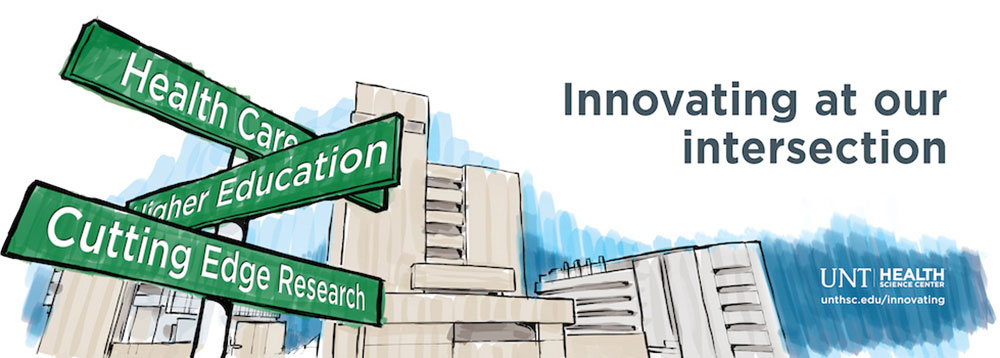Published: May 10, 2018

For more than 40 years, UNT Health Science Center has been an innovator in training health care professionals, in pushing the frontiers of scientific knowledge and in improving public health.
Ten areas of innovation and excellence
1. The silver tsunami
Our researchers are focused on ways to confront the so-called “silver tsunami,” the growing number of Americans who suffer from Alzheimer’s disease and other ailments of the aging.In the next decade, the number of Alzheimer’s cases is expected to soar by 44 percent, rising to more than 7 million people by 2030 and threatening to cripple the country’s health care system.A highly reliable blood test to detect Alzheimer’s currently is being developed in our labs and could be a key to early diagnosis – and more effective treatment.
2. Compassionate cancer treatment
Traditional treatments like chemotherapy or radiation often pose a debilitating ordeal for cancer patients. Our researchers are making great strides in helping change that by pioneering drug-delivery systems that target cancer cells while leaving normal cells alone.
3. DNA superstars
Our DNA forensic DNA experts are tops in the nation, trusted colleagues of law enforcement agencies across the United States who regularly seek their expertise to aid in violent-crime investigations and to identify human remains. The Center for Human Identification is the largest contributor of DNA profiles to the FBI’s Combined DNA Index System, or CODIS.
4. Treating society’s most vulnerable
From the beginning, UNTHSC has focused efforts on providing health care to the most vulnerable elements of the Fort Worth community – its young and its old. Our Pediatric Mobile Clinic brings basic health care to children in four underserved neighborhoods of the city. Our Mighty Care Program targets Medicaid-eligible seniors, offering primary care services through free-standing neighborhood clinics. In addition, our medical students and volunteer physicians treat the homeless at regular clinics at the Presbyterian Night Shelter and in other community settings.
5. Primary care
Long before primary care became a linchpin in national health policy, UNTHSC was one of the top producers of primary care physicians in the nation. Today, more than 60 percent of our Texas College of Osteopathic Medicine graduates enter primary care. Many stay to practice in Texas, helping alleviate the state’s critical shortage of doctors.
6. The importance of teamwork
Medical education is being transformed by the recognition that that cooperation and coordination in providing health care to an individual patient can reduce medical errors, control costs and provide optimum care. And UNTHSC is at the forefront of that movement. From their first day of classes, our health care students are trained to work across disciplines to keep the patient at the center of care decisions.
7. Training health professionals
As the demand for health care grows, so does the need to train health professionals to help carry the load. Our health professional programs produce physical therapists and physician assistants that work side-by-side with physicians to meet the needs of their patients. The physician assistant profession, in particular, is booming. Since 2006, there has been a 34 percent increase in the number of people entering the field.
8. Meeting the need for rural doctors
In many areas of rural Texas, health care providers are few and far between. To address that need, UNTHSC created Rural Osteopathic Medical Education of Texas, or ROME, which sends student physicians into rural settings where they can experience first-hand the rewards of practicing medicine in places where the need is greatest.
9. Safeguarding the public’s health
The world is a dangerous place. As people and food move more easily across borders, an unwelcome side effect is the ease with which illnesses can move rapidly from remote villages to population centers. Poor sanitation, environment impact and a lack of health resources encourage the rise of new diseases in remote corners of the globe that can impact the health of Americans. To combat that, UNTHSC is training public health experts to improve the conditions and behaviors that affect the health of us all.
10. A culture based on values
We have committed ourselves to creating a culture at UNTHSC based on values that all our team members hold dear. Those values, by which this University will be governed and by which we will be judged, were developed through a bottom-up, grassroots effort in which every team member was encouraged to participate. The values are Serving Others First, Integrity, Respect, Collaboration and Be Visionary.